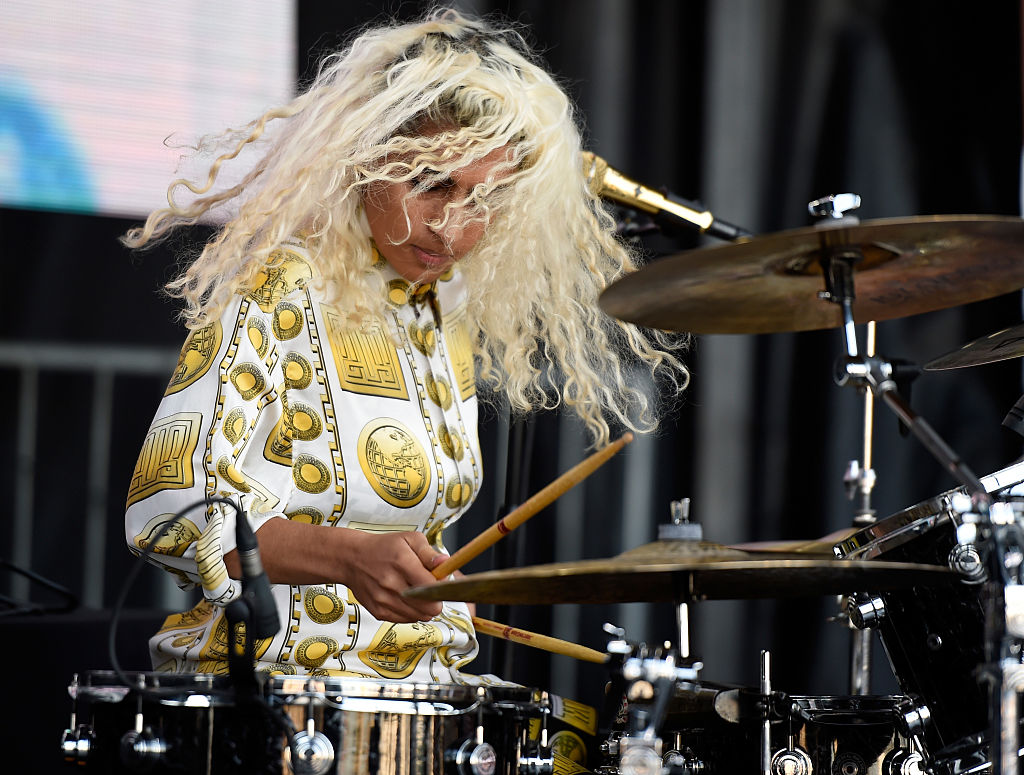When women can’t exchange information or experiences that they are having, we end up suffering in silence.
— Madame Gandhi
The Lesbians Who Tech summit — a celebration of queer women in the tech industry — took place February 23-26th in San Francisco. The goal was to connect women in the industry to one another and to bring their contributions and talent to the fore. The conference also aimed to inspire young women to chase their tech dreams, a message that’s hugely important — with women only representing 1 out of 15 people in STEM.
This year, musician and activist Kiran Gandhi AKA Madame Gandhi was a keynote speaker at the event. Gandhi is a feminist artist who pairs a revolutionary voice with incredible talent and drive. Formerly the drummer for MIA and Theivery Corporation, and known worldwide for her work de-stigmatizing menstruation (famously running the London Marathon in 2015 on the first day of her period without a tampon or pad), Gandhi’s recent electronic music project, Voices is a celebration of feminism and a battle cry for women caught in cycles of oppression.
Gandhi’s speech at Lesbians Who Tech focused on women being unafraid to own their voices and to speak their truth proudly.
“I felt really happy to give this particular talk because it allows me to tell my story. To own my voice,” Gandhi said. “A lot of us are not socialized from a young age to be confident, to have a voice, to stand firm in our opinions. Instead, we often accompany our opinions with an apology, or we eat less to specifically take up less space as women. I think all of that’s got to go. We now, more than ever, must assert ourselves. Must be strong when we have an opinion. And must be brave enough to give that opinion loudly and strongly.”
Gandhi is articulate and passionate about activism. And that passion is intertwined tightly with her sound as a musician. One of her song titles, “The Future is Female,” is also her mantra. She’s not hesitant about using her art as a platform for awareness and change.
“Each of us has to identify the mediums in which we can communicate and make change,” Gandhi said. “And for me it’s my music, my speech, and my written work. And in my live shows, I tend to combine my ability to speak publicly with my ideas on what exactly it is that we’re fighting for today in the modern feminist movement.”

Her songs fall into what Gandhi calls “3D femininity” — representations of women as three dimensional human beings with the full spectrum of emotions and characteristics women possess.
“The reality,” Gandhi said, “is that all of us are far more complex than Hollywood and the music industry tries to portray us.”
When she was creating her record, Voices, she wanted it to sing with that spirit of 3D femininity. The result is an empowering, emotional sound journey. The songs on the record metaphorically symbolizing the power, voices, and range of feeling women have; voices that are silenced on a daily basis.
Gandhi’s activism reaches well-beyond her art. She continues to work tirelessly to use her voice, money, and platform to fight against oppression. Recently, she threw a fundraiser near Los Angeles’ skid row to provide homeless women in the area with menstruation supplies. Period shaming and access to tampons/pads is one of the many causes Gandhi champions.
“If you asked me what is the most effective form of oppression,” Gandhi said, “it’s stigma. Because it denies us the ability to talk comfortably and confidently about our own bodies. When women can’t exchange information or experiences that they are having, we end up suffering in silence.”
With all that she does, Gandhi was the perfect speaker at Lesbians Who Tech, an organization that gives voice to kick ass women, offering up a platform to speak truth to power. It’s a basic right not always afforded to women and one that Gandhi encourages women everywhere to exercise.
“A lot of times, we as young women are taught that we have to be likable and agreeable over equal and true,” she said. “And so what we tend to do is just say nice platitudes to be kind to everybody. Now being kind is a good thing, but not when it comes at the expense of our own authentic self-expression.”






